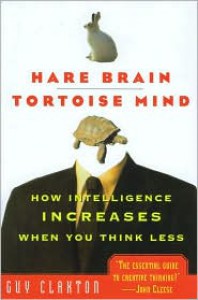“Unencumbered by the Thought Process”

This book has been around a while, but it has aged well, with the exception of a few sections in the final chapter in which the author considers the future. Not bad. I read it around the turn of the 21st century when it first came out. At the time, I was an academic, not a fiction writer, so I read it as psychology research. Then as now, I practiced yoga and meditation, so the observations on mindfulness and the relationship of our busy “hare brain” with our slower, nonverbal “tortoise mind” or undermind were meaningful to me both times through the book.
The second time around, however, Claxton’s examination of how the undermind works struck me as relevant to mystery fiction. In a number of well-written series, I’ve noticed how authors integrate their detectives’ intuition with their reasoning. The undermind detects subtle patterns and changes in them that the conscious, logical, reasoning mind doesn’t. When these discoveries surface and both minds meet, so to speak, it can seem like an epiphany. Scientists, inventors, psychotherapists, and other who face problems or puzzles that are complex and ambiguous go through this process.
So do writers, at least those of us who don’t plan ahead with an outline. A pantser” (one who writes flying by the seat of her pants) creates a plot without consciously knowing where it's going, often not knowing who committed the crime let alone how it will be solved, and yet the undermind seems to know, planting clues and connecting patterns. The logical mind has to follow up and cut, revise and polish, tightening the undermind’s creation, but the first draft bubbles up from below the surface.
Claxton cites studies in which research subjects performed worse under pressure and when trying to succeed, and better when they were told to play. If we’re too serious and ambitious, we may be less intelligent. Much learning takes place by simply messing around with things and ideas to see what works. Without leisure, without mental open space in which to mess around and let the undermind play, we miss access to our deeper wisdom.
Next time you have a flash of inspiration in the shower or while washing dishes, thank your undermind. I’ve solved more plot problems and had more ideas on a four-mile run than I ever have by structuring an outline. No headphones. No input. Just me and my undermind. Unencumbered, as Tom Magliozzi used to say, by the thought process.
 3
3


